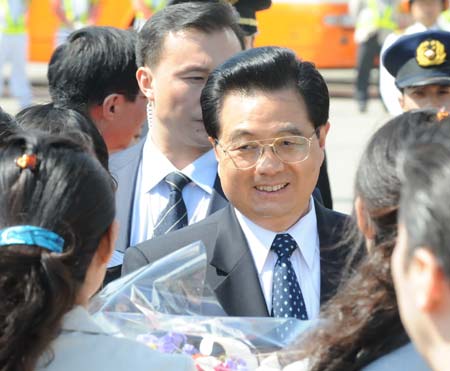
Chinese President Hu Jintao(C) arrives in Tokyo to begin
his five-day "warm spring" trip to Japan aimed at boosting the strategic and
mutually beneficial relationships between China and Japan, yesterday. --Xinhua
The Sino-Japanese relations are facing new opportunities for further
development, Chinese President Hu Jintao said yesterday.
In a written statement issued at the airport upon his arrival in Tokyo, Hu
said both China and Japan are important countries in Asia and in the world, and
"the development of a long-term stable and good neighborly friendship between
China and Japan is in the fundamental interests of the two countries and the two
peoples."
The Chinese president arrived in Tokyo yesterday, kicking off a five-day
"warm spring" trip to Japan aimed at boosting the strategic and mutually
beneficial relations between the two Asian nations.
In the statement, Hu said this year marks the 30th anniversary of the signing
of the China-Japan Treaty of Peace and Friendship, and the China-Japan relations
are facing new opportunities for further development.
The president expressed the hope that his visit will help enhance mutual
trust, strengthen friendship, deepen cooperation and make programs for the
future, and added that China will work together with Japan to open up new
prospects for comprehensively pushing forward the China-Japan strategic and
mutually beneficial relations.
Hu said he will meet with Japan's Emperor Akihito, have an in-depth exchange
of views with Japanese Prime Minister Yasuo Fukuda on bilateral relations and
other issues of common concern, and have extensive contact with Japanese people
from different walks of life.
He expressed the belief that through joint efforts of both sides, his visit
would achieve expected results.
Hu was greeted by Japanese Foreign Minister Masahiko Komura and Chinese
Ambassador to Japan Cui Tiankai at the airport.
Hu's visit to Japan, the first by a Chinese president in a decade, is seen as
a step aimed at further improving the once-chilly Sino-Japanese relationship,
which began to thaw with the "ice-breaking" visit by former Japanese Prime
Minister Shinzo Abe to China in October 2006.
That event was followed by the "ice-thawing" Japan trip by Chinese Premier
Wen Jiabao in April last year and Fukuda's "spring-herald" visit to China last
December.
In an interview with Japanese journalists on Sunday, the Chinese president
said his state visit to Japan will have the atmosphere of a "warm spring" and he
wished for a "warm spring for the friendship between the two peoples."
The Sino-Japanese relations are improving further. The leaders of the two
countries have maintained frequent contacts, and cooperation in politics, trade,
culture and defense has been fruitful.
The two countries have also held close consultations on such global issues as
climate change and sustainable development.
The economies of the two countries are deeply intertwined. China was Japan's
top trading partner last year while Japan was China's third largest with two-way
trade amounting to 236 billion U.S. dollars. Japan's accumulative foreign direct
investment (FDI) in China has reached 60.7 billion dollars, making Japan China's
second largest source of foreign investment.
"The improvement and development of the Sino-Japanese relationship is in the
fundamental interests of both peoples and also conducive to peace, stability and
development in Asia. We are ready to make joint efforts with Japan to further
the relationship," said Chinese Foreign Ministry spokeswoman Jiang Yu at a press
conference on April 29.



